Singles
Cameron Crowe's spotty mix CD to Seattle's music scene
SINGLES (1992) is a love letter to the city of Seattle, to its music scene or what would become known around the world the year of the film’s release as “grunge rock,” and the steps men and women stumble over in their journey as new adults. In descending order, that’s what the film is most interested in. Written and directed by Cameron Crowe, it does have authorial vision, which the new adulthood comedy he wrote but did not direct–The Wild Life (1984)--lacks, but stagnates a bit and isn’t blessed with the fortune of his directorial debut, Say Anything … (1989).
Perhaps in an effort to brush up what he’d tried to say about life after high school in The Wild Life–which Fast Times at Ridgemont High (1982) producer Art Linson directed from Crowe’s screenplay–the former writer for Creem and Rolling Stone magazines began scribbling ideas for a new script in 1983. Crowe’s goal was to capture the feeling of being in your twenties. Growing up in San Diego, California, he’d spent much of his teens and twenties unmoored, following rock bands on the road. Crowe initially set his twentysomething project in Phoenix, Arizona. Dating musician Nancy Wilson of Heart, he began making trips to her home in Seattle, Washington. The couple were married there in 1986 and Crowe made the city his home. He discovered KCMU, a radio station run by volunteers out of the University of Washington. KCMU, as it existed then, was known for a fierce connection to the community. They programmed alternative music, which in the mid-eighties included local bands like Mudhoney. Crowe met Heart’s publicist, Kelly Curtis, who was managing the Seattle band Mother Love Bone. In addition to shooting some second unit photography in Seattle for Say Anything …, Crowe sneaked a Mother Love Bone song (“Chloe Dancer/ Crown of Thorns”) into a scene between John Cusack and Joan Cusack.
Crowe drew inspiration from Do The Right Thing (1989) and how Spike Lee used an ensemble cast to tell one big story about Brooklyn. He was reworking his old script, titled Singles, when in March 1990, Mother Love Bone’s lead singer and lyricist Andrew Wood died in Harborview Hospital, where he’d been placed on life support following a heroin overdose. Convening to Curtis’s house to pay his respects, Crowe was struck by how much of Seattle seemed to come together around Wood’s death. Feeling like he had a hometown for the first time in his life, Crowe not only reset his script in Seattle but began filling it with the music, locations and people he knew. This would include Chris Cornell, lead singer of Soundgarden, which Crowe ranked as the best live performance he’d ever seen from a band. While he’d experiment with casting Cornell in the role of Cliff Poncier, a man who holds down three jobs not including lead singer of his band “Citizen Dick,” the only person Crowe wrote for was Bridget Fonda, whose character Janet Livermore had moved from Tucson and fallen for Cliff despite his doofiness.
Executive producer Art Linson had a development deal with Warner Bros. and the studio assigned Richard Hashimoto, an assistant director in the seventies turned film producer in the eighties, most notably with Beetlejuice (1988), to produce Singles with Crowe. Warner Bros. hesitated setting the romantic comedy in Seattle–which in 1990, they associated with inclement weather and suicide, not music–and Crowe resorted to sending executives care packages with mix CDs of Mudhoney or Mother Love Bone. To play Steve Dunne, a mass transit planner and perhaps the most conventional character in the script, Crowe offered the part to Johnny Depp, who passed. Bridget Fonda came aboard to play Janet, with Matt Dillon as Cliff and Kyra Sedgwick as Linda Powell, who conducts environmental research for a non-profit and Steve becomes enamored with. Campbell Scott, finishing what was thought to be a breakout role as a leukemia patient opposite Julia Roberts in Dying Young (1991), was cast as Steve. For the role of the resident manchaser at the Capitol Hill apartment complex where the characters lived, Sheila Kelly of the television series L.A. Law was chosen over pop star Paula Abdul, who Crowe credited for almost getting the part.
Shooting commenced in March 1991 in Seattle. To play Cliff’s bandmates, Crowe cast Stone Gossard and Jeff Ament from Mother Love Bone, along with their new lead singer, a quiet guy from San Diego named Eddie Vedder. Their band soon settled on the name Pearl Jam. The first day the cast assembled in Seattle for rehearsals, they blew off steam at the Off Ramp Café, where Pearl Jam was performing their second ever gig. Vedder would write and Pearl Jam perform “State of Love and Trust” for the film, overheard during the scene where Linda and her co-worker Ruth (Devon Raymond) go clubbing at The Vogue. Another local band, Alice In Chains, performed “It Ain’t Like That” and “Would?” when Steve and Linda meet, shot in a warehouse on Pier 29 converted into a nightclub for the film. Crowe tapped Chris Cornell to both appear as one of Cliff’s neighbors and perform with Soundgarden at Central Tavern, where Steve sulks after breaking up with Linda. The director also added Jeff Ament to the art department, using the bassist’s handwriting for the opening titles and having him dress Cliff’s apartment, lending promotional posters or music magazine cutouts Ament had in his pad.
Singles held its first test screening in Glendale, California on 11/6/1991 (dates were recorded in a production diary Crowe logged, which Rolling Stone published shortly after the film’s release). Reaction from the mostly teenage recruited crowd was, according to Crowe, average. A trusted friend who Crowe screened his film for offered that the movie grabbed him and held on, but lost some focus when Steve and Linda seemed to break up without Crowe providing a clear reason why. The writer/ director convinced Warner Bros. to allow him to return to Seattle for reshoots with Campbell Scott, in which Steve crawls into a phone booth and dials Linda’s answering machine, asking for another chance. The second test screening, held in Marina Del Rey on 1/23/1992 with the new material, showed improvement, but by now, Warner Bros. was beginning to lose whatever enthusiasm they might have had for Singles. Crowe had observed some audience restlessness between laughs, and contended that his film was for college audiences more so than the teenagers being pulled out of malls. Not sure what they had, the studio bumped Singles from its planned February 1992 release to an undetermined date.
In January 1992, an LP titled “Nevermind” by a band named Nirvana hit #1 on the Billboard charts. Its success catapulted lead singer and lyricist Kurt Cobain into generational poet/ rock god status and led journalists to write wondrous articles on the music scene in Seattle, which along with Nirvana, was producing Alice In Chains, Hole, Pearl Jam, Smashing Pumpkins, Soundgarden, Stone Temple Pilots, and Temple of the Dog. The new sound coming out of Seattle was christened “grunge rock.” According to Crowe, the new question from Warner Bros. was why Nirvana wasn’t in their movie (Crowe had worked in a terrific cameo for TAD frontman Tad Doyle, as the dude who Janet misdials and talks dirty to). To capitalize on the “grunge rock” phenomenon, Epic Records, the label releasing the film’s soundtrack, lobbied Warner Bros. to allow them to get CDs, cassettes and records into stores immediately. This forced the studio to settle with Crowe on his choice of the film’s title: Singles. Released in June 1992, the album, which included two new songs by Paul Westerberg of the Replacements, writing much of the film’s music, was a hit. In September 1992, Singles opened on 1,073 screens in the U.S. before expanding to 1,330 its second weekend. It was buried between Sneakers and The Last of the Mohicans, holding onto a spot among the top ten grossing films for three weeks. Unlike those films and many like it crowding theaters, Singles didn't cost much, earning it status as a niche market hit.
Warner Bros. saw something in Singles, proposing to Crowe they adapt it into a television series. Bad memories of Fast Times, the 1986 CBS series which ran for seven episodes based on characters he’d created in Fast Times at Ridgemont High, prompted Crowe to decline. In December 1993, TV writer/ producers David Crane & Marta Kaufmann, who had a development deal with Warner Bros. Television, pitched a sitcom to NBC they called Friends Like Us. Their pitch was about six single twentysomethings who hang out at a coffee shop and grapple with new adulthood. By the time 52.9 million households were watching the Super Bowl episode of Friends in 1996, Crowe couldn’t decide whether to be flattered or to sue. Even if flattery went no further than civil litigation would’ve, Crowe has every reason to be proud of Singles, which for its flaws, comes from somewhere intimately personal. A lot like the ink stamps clubs use on their patrons’ palms, it’s messy, but unlike the sitcom that mirrored it, isn’t easy to scrub off.
The problem with Singles is that it has one earbud in a crisp Billy Wilder/ I.A.L. Diamond romantic comedy from the late fifties/ early sixties like The Apartment (1961) and another earbud in grunge rock, a big chunk of which was sort of like heavy metal from bands who journaled, with growly vocals and distorted guitar. Generally speaking, this is music better suited to a drama about a disillusioned male loner than a comedy about relationships. It’s easy to imagine Nicolas Cage’s character rocking out to Alice In Chains on his way to the liquor store in Leaving Las Vegas (1995), hardly a laughing matter. Crowe tries to lighten the soundtrack by hiring Paul Westerberg to compose the music, lending it something of a New Wave/ indie pop vibe, but in order for the grunge rock to be turned down, the characters would’ve needed to have been dialed up with more agency than they’re given. None of them possess a quarter of the desire of Lloyd Dobler (John Cusack) in Say Anything … who’d tell these slightly older characters that they were wasting their time.
Top-billed Bridget Fonda plays the wholesome blonde who moves to the West Coast and develops googly eyes for the first singer who returns her gaze. She’s a real person, but isn’t interesting. Her character makes a connection with a gentle plastic surgeon (Bill Pullman, entering a cycle where he’d play the nice guy who the heroine ditches for someone exciting), but instead of inviting the doc to the club to walk on the wilder side, she goes back to mooning over Cliff, who in turn would’ve been a more compelling character coming to terms with his mediocrity, forced to figure out what comes next for him. Crowe isn’t tough enough on his characters, as if he was afraid they wouldn’t want to hang with him anymore. Singles is at its best in its details. There’s the earnestness of Steve, who believes he can solve traffic congestion in our times if Seattleites would just buy into a supertrain, to which they respectfully reply, “I love my car.” Campbell Scott gets the best line in the movie, when Kyra Sedgwick’s character asks what took him so long to come back to her: “I was stuck in traffic.” By writing with wit and insight about people coming through his living room, Crowe can’t be faulted for perpetrating a cash grab. He’d narrow his focus and write characters with more passion and purpose in his next film, Jerry Maguire (1995).
Video rental category: Romantic Comedy
Special interest: Fictional Bands


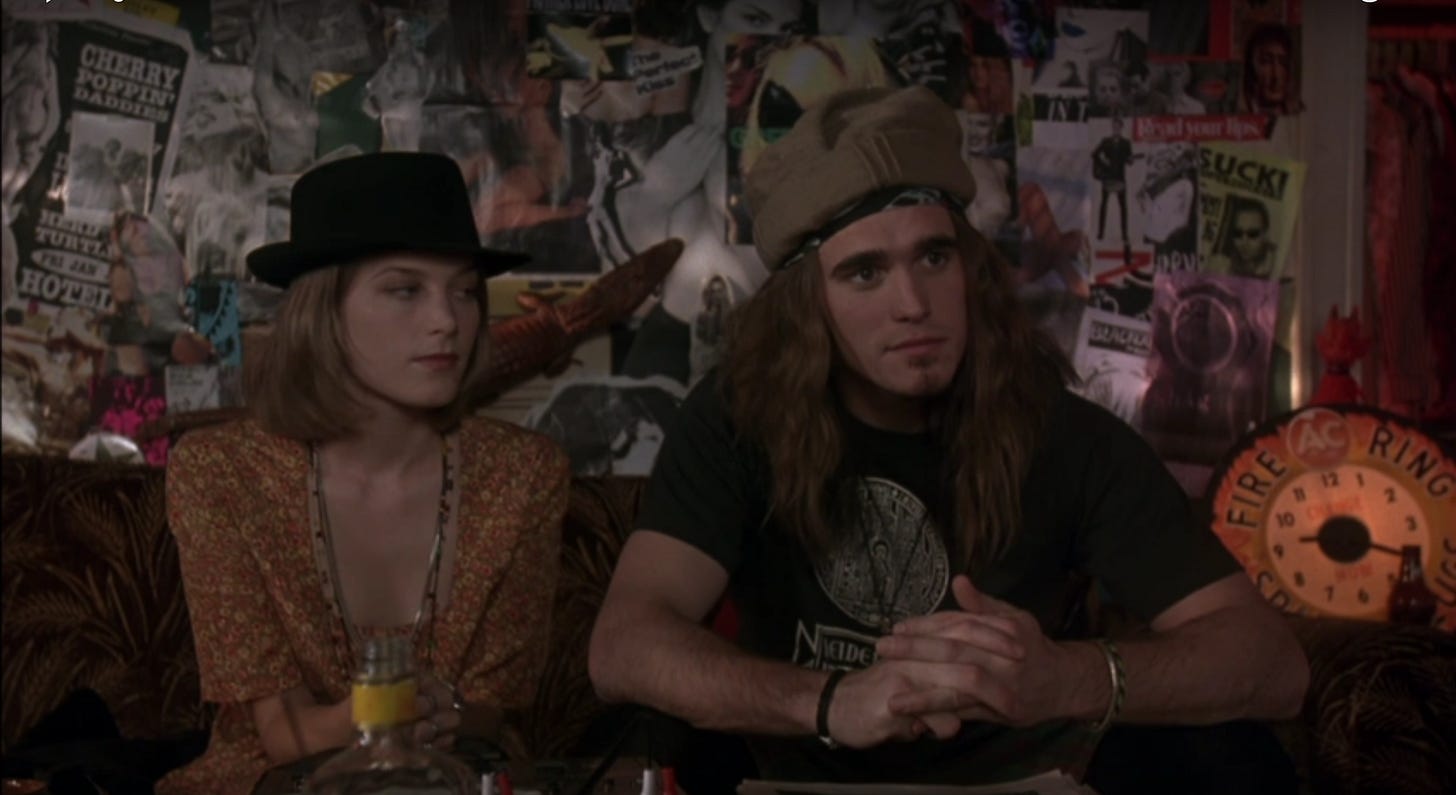
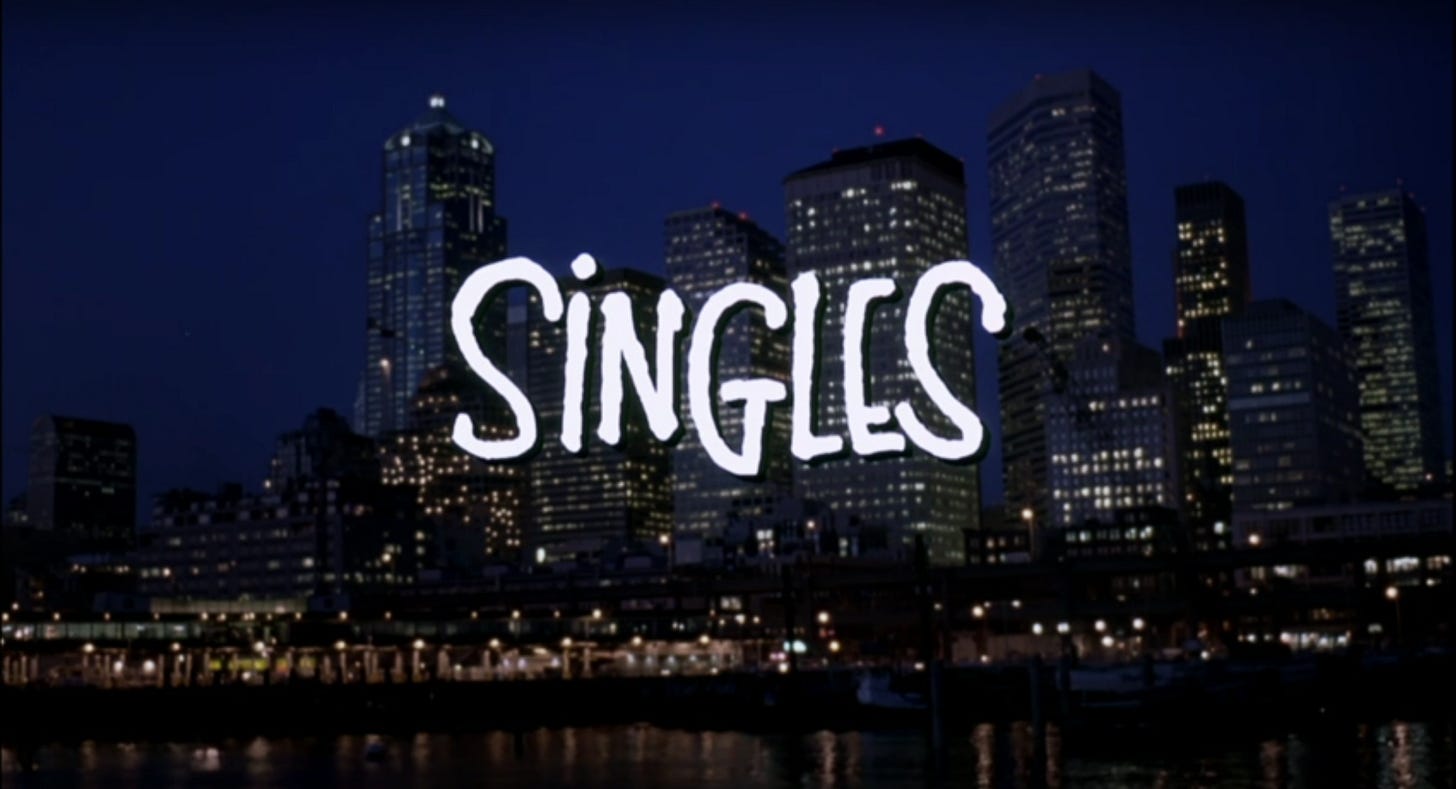
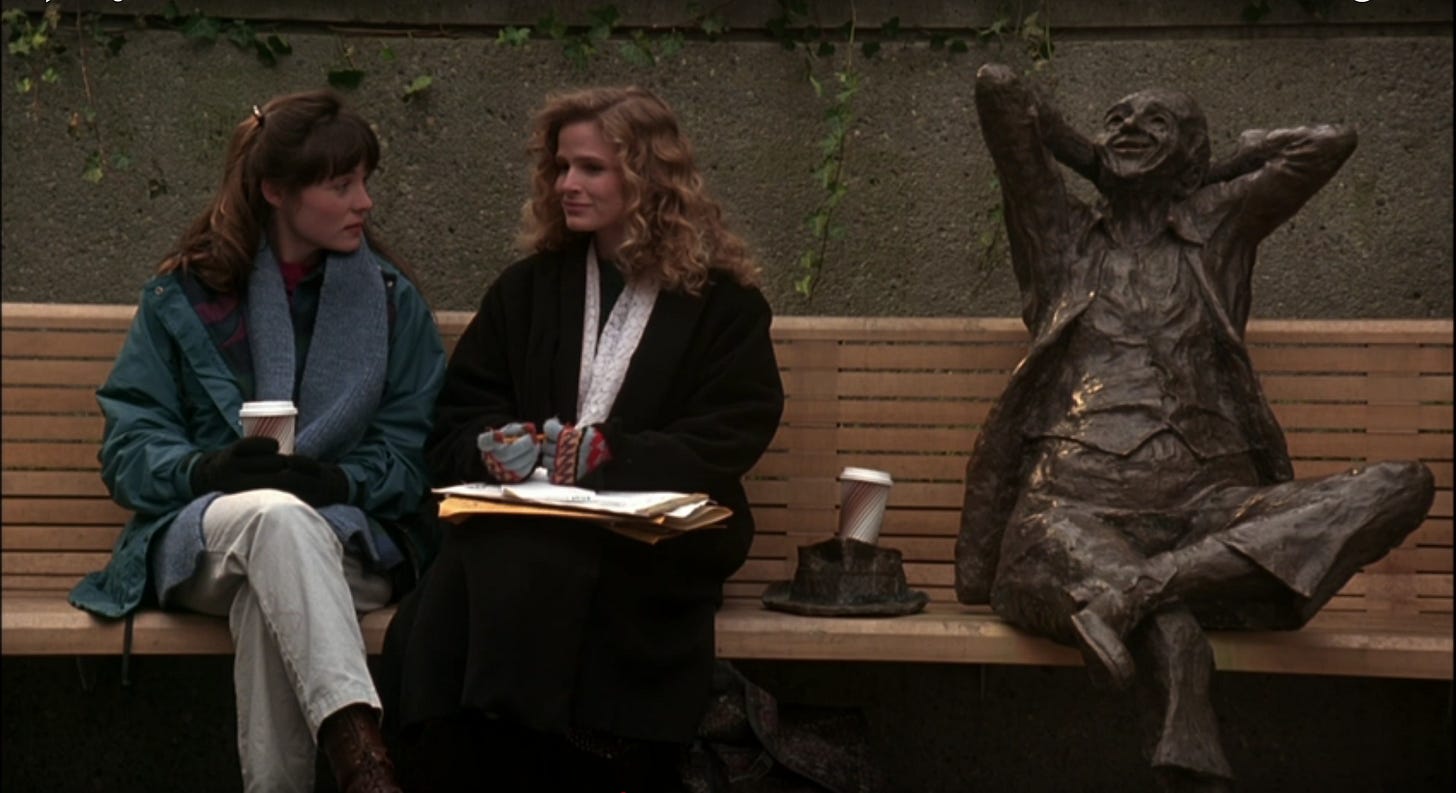
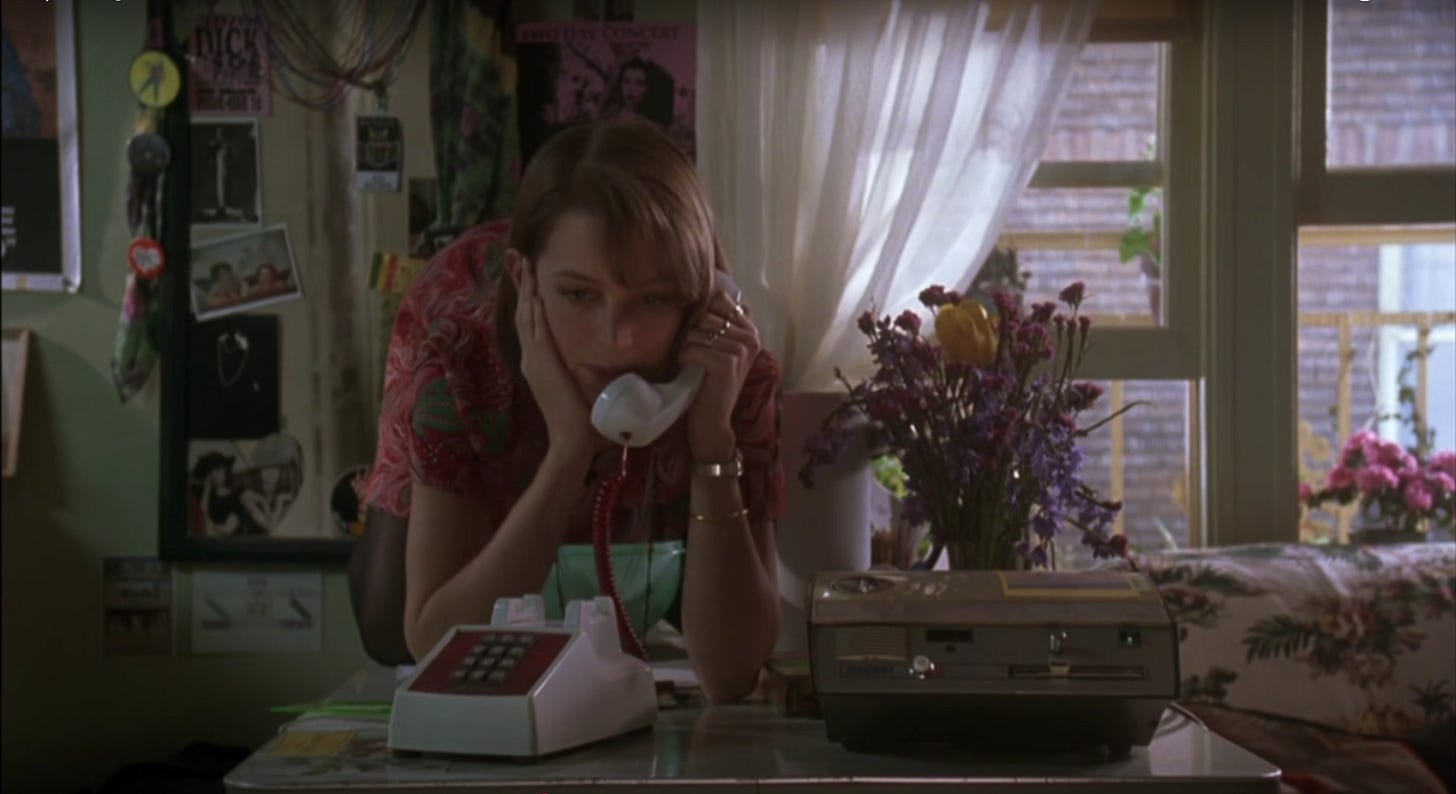
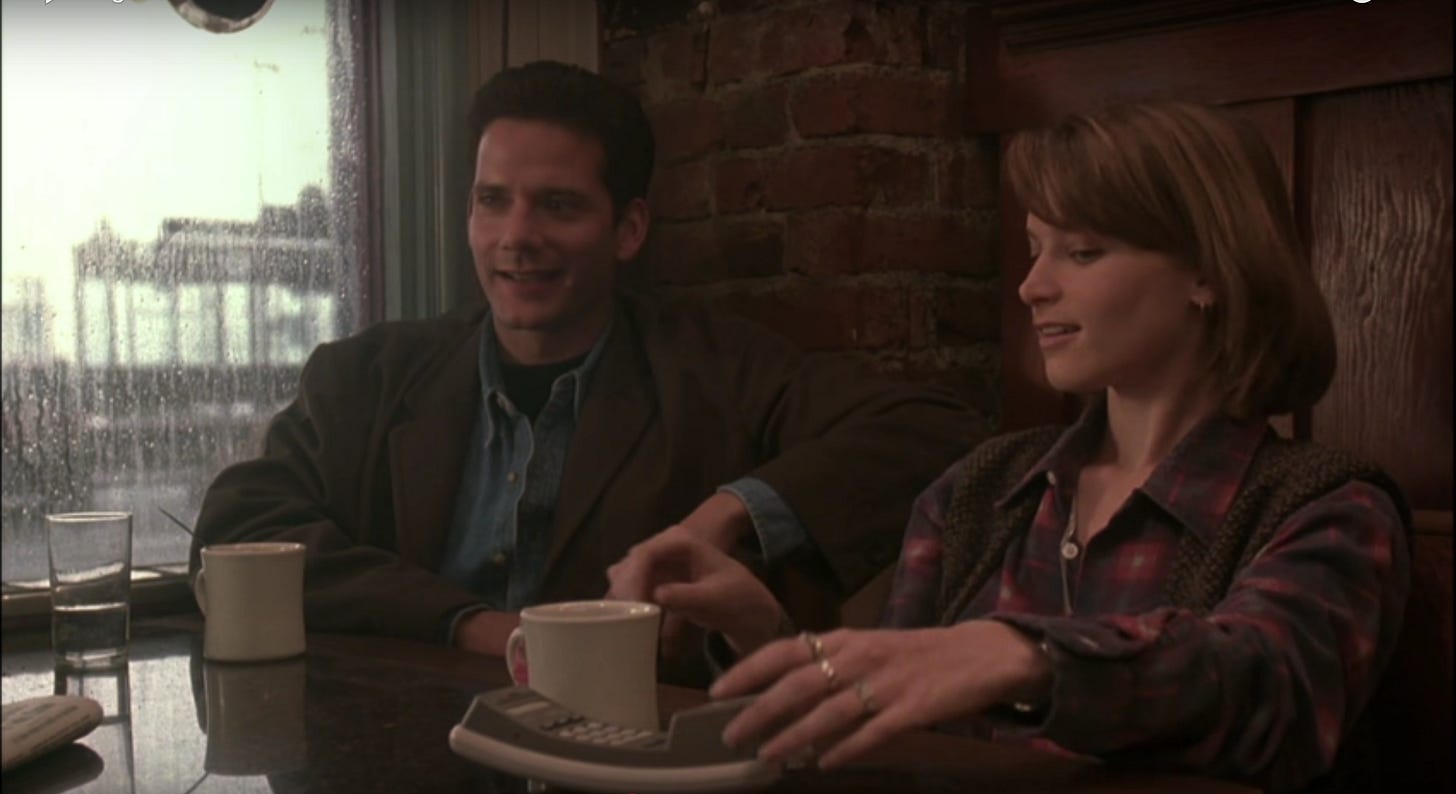
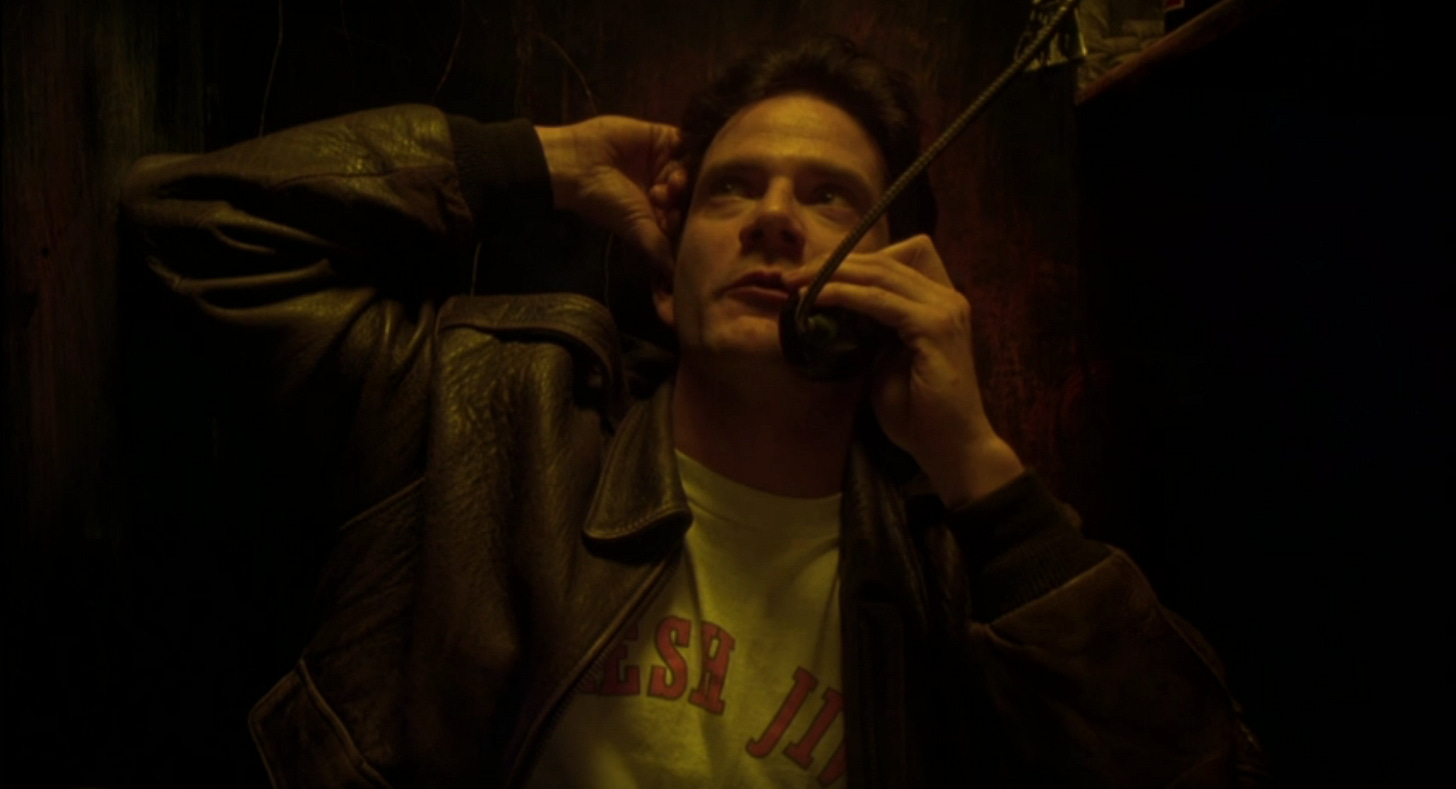
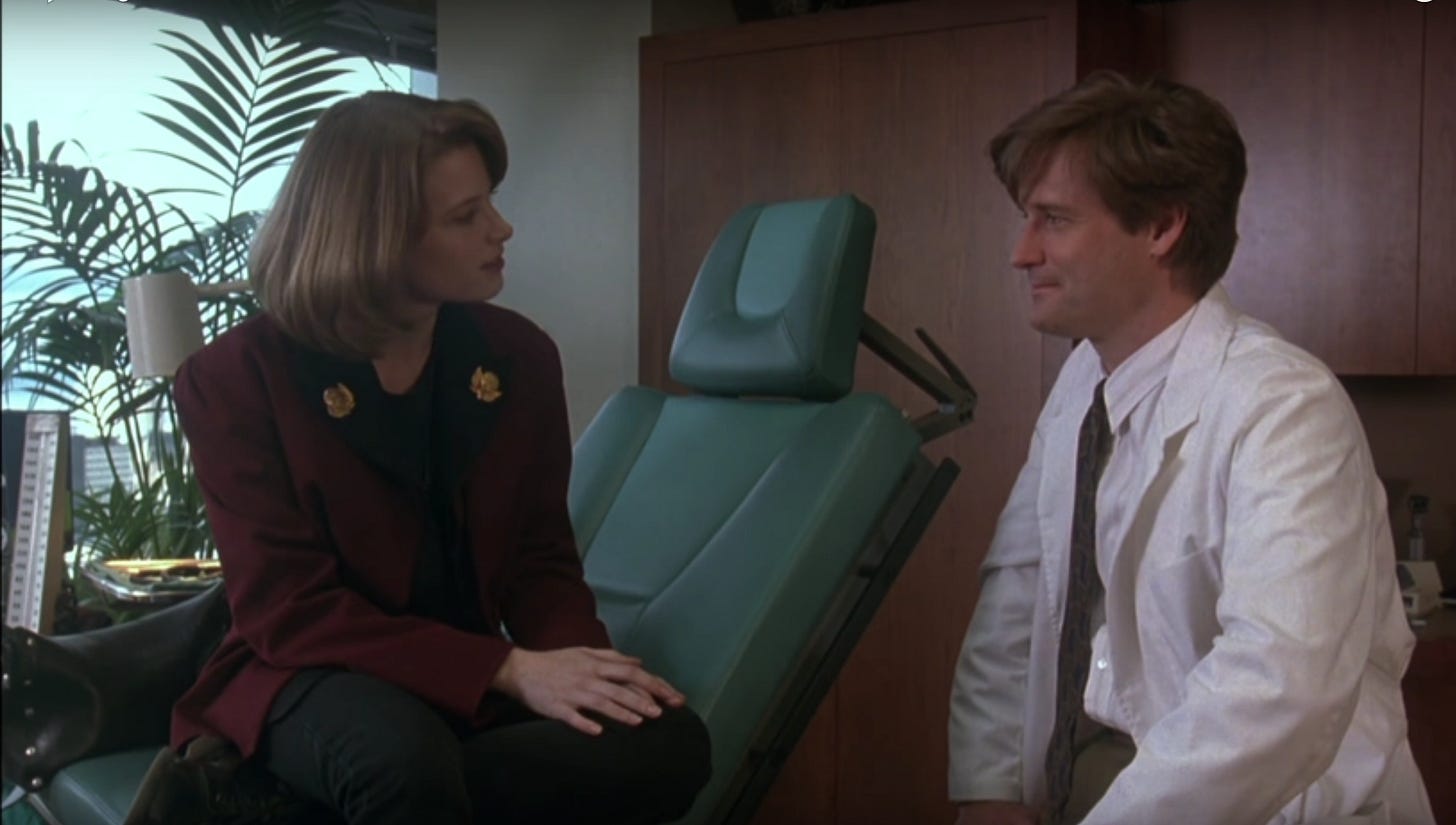
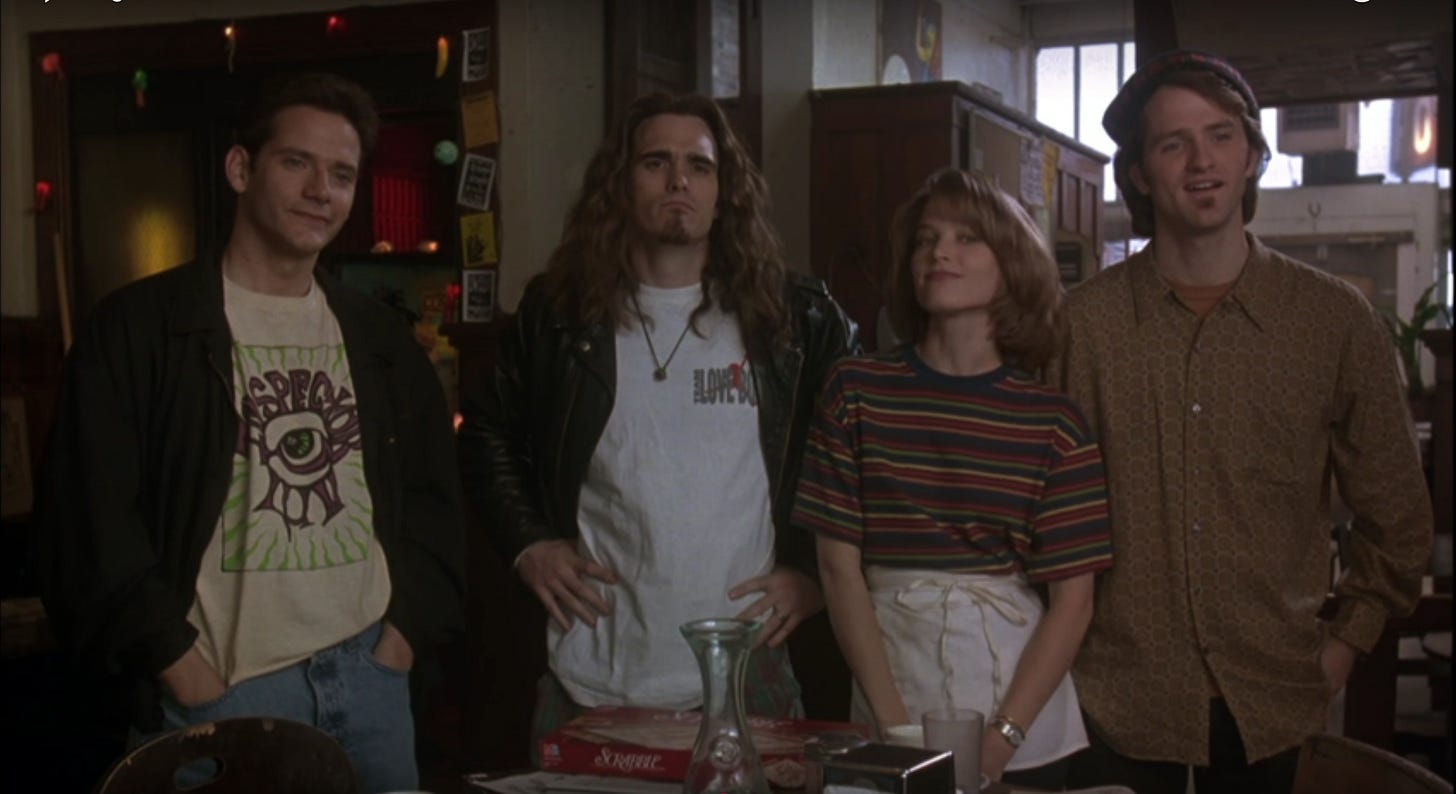
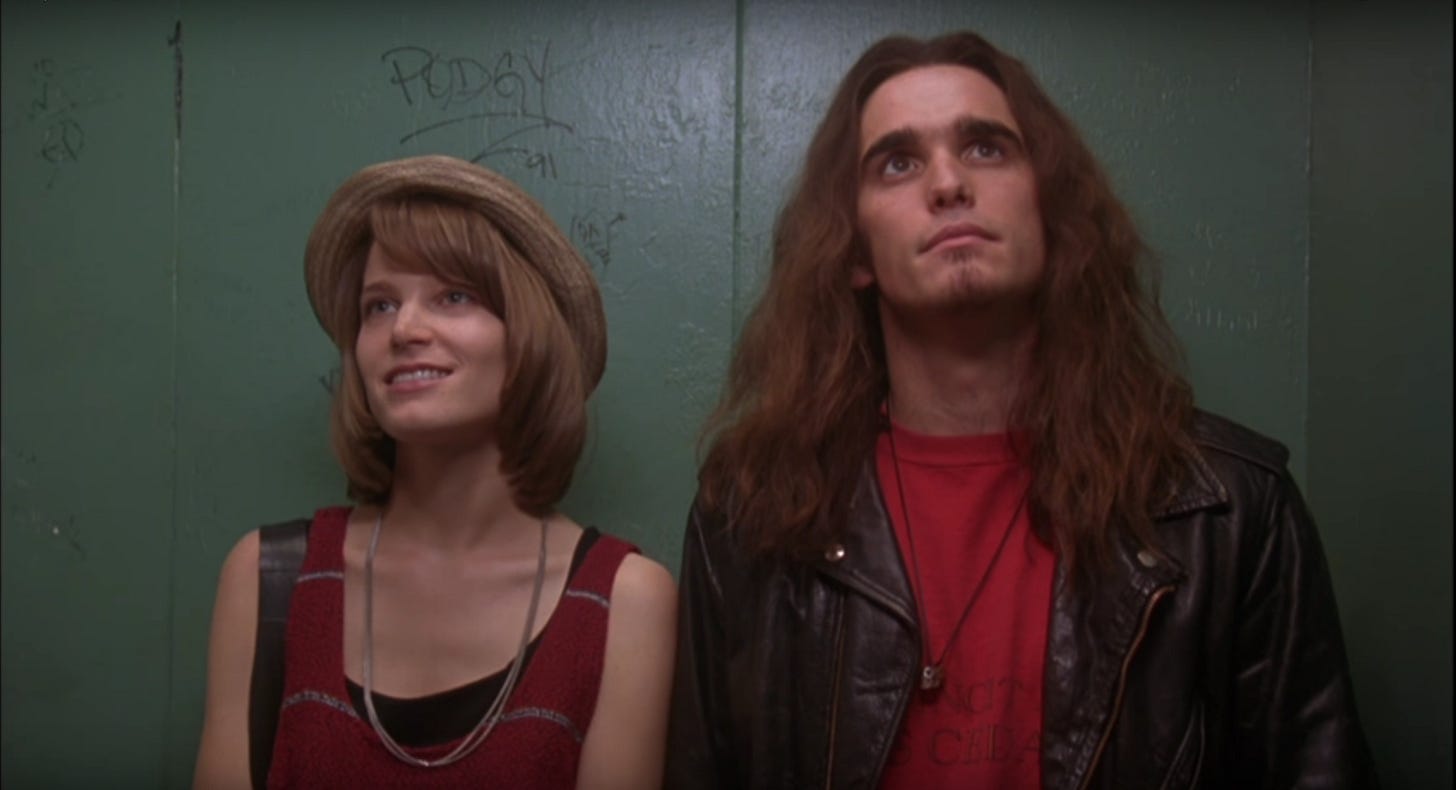
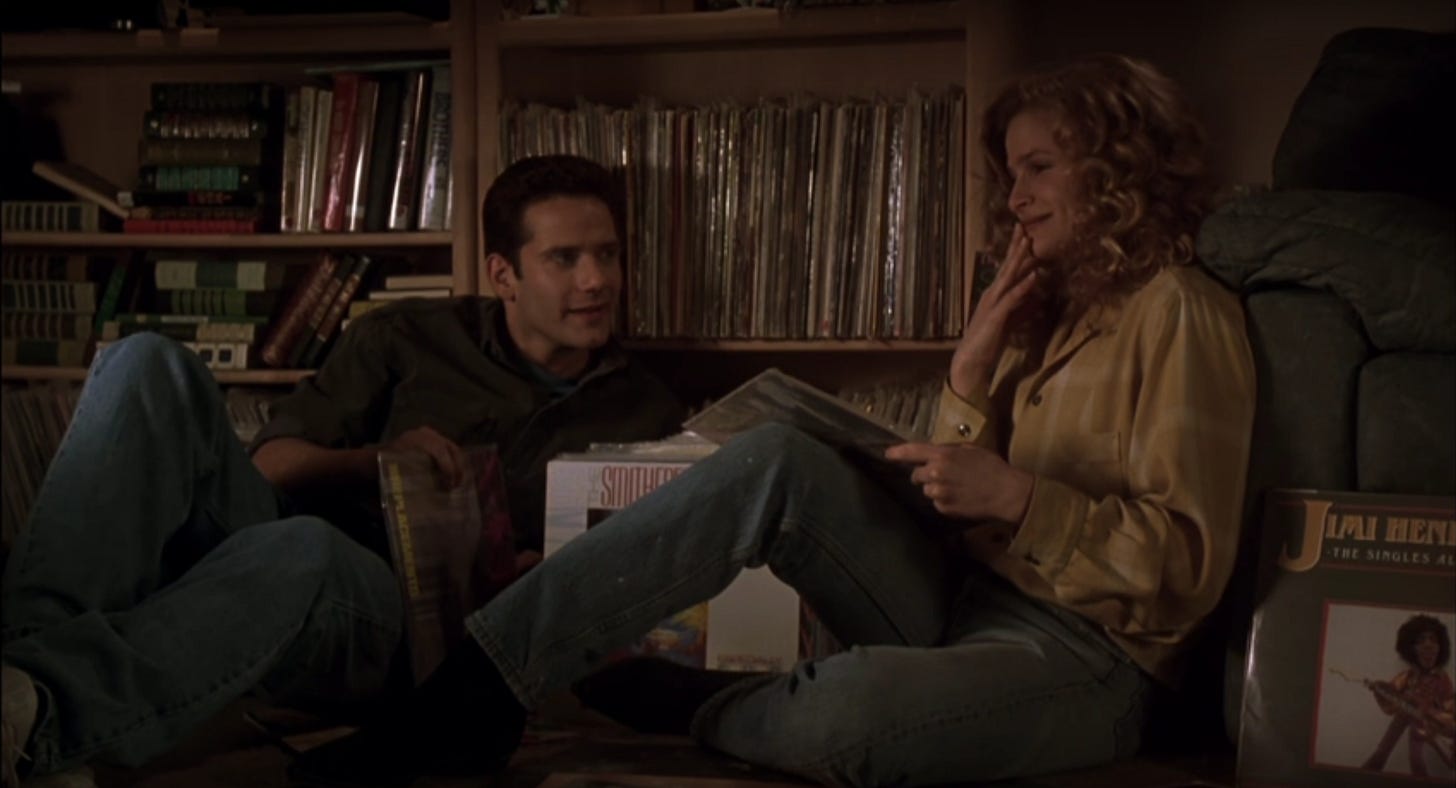
Hey Joe, thank you for this… I never saw the movie singles but reading about all the rock ‘n’ roll connections. It’s like discovering Neil Young and Rick James hung out in Canada before Buffalo Springfield, or that Paul had Jane Asher as a girlfriend who is connected to Peter and Gordon or that the Beatles wrote a song for the stones which launched their careers etc. etc. etc. a great read brother thank you! Peace! CPZ